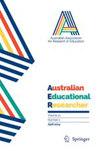对文化反应的阶级意识方法
IF 2.4
3区 教育学
Q2 EDUCATION & EDUCATIONAL RESEARCH
引用次数: 1
摘要
在过去的几十年里,在为有色人种青少年服务的学校中,学术研究和文化响应和持续教育(CRSE)方法的应用有所增长。越来越多的研究表明,CRSE是一种有效的策略,可以吸引有色人种学生,打击有害的刻板印象,提高学业成绩。尽管有这些重要的贡献,CRSE的学术和实践并没有充分探索社会阶层的重要性,尽管它与学业成绩、与身份的深刻联系、与种族和种族化的关系有着长期的相关性。借鉴从民族志研究中收集的经验教训,这已经证明了社会阶级分析的重要性,本文呼吁在CRSE方法和应用中更加强调和承认阶级。作为当今教育中使用的最突出和最有用的教学策略之一,CRSE将受益于更广泛的社会阶层包容,这将对寻求有效教育历史上边缘化人群的从业者和学者产生重要影响。更深入地了解阶级的意义还可以帮助教育工作者和学者避免使有害的文化刻板印象永久化,例如模范少数民族神话和贫困文化。然而,一个有阶级意识的CRSE的补充也必须保持其反赤字的观点,以避免对工人阶级青年的本质主义观点。本文章由计算机程序翻译,如有差异,请以英文原文为准。
Toward a Class-Conscious Approach to Cultural Responsiveness
The last several decades have seen a growth in scholarship and application of culturally responsive and sustaining educational (CRSE) approaches in schools serving youth of color. A growing body of research has shown how CRSE serves as an effective strategy to engage students of color, combat pernicious stereotypes, and improve academic outcomes. Notwithstanding these important contributions, CRSE scholarship and practice have not fully explored the significance of social class, despite its long-standing correlation with academic performance, deep connections to identity, and relationship to race and racialization. Drawing on lessons gleaned from ethnographic research, which has demonstrated the importance of social-class analyses, this essay calls for a greater emphasis on and recognition of class in CRSE methods and application. As one of the most prominent and useful sets of pedagogical strategies used in education today, CRSE stands to benefit from a wider inclusion of social class, an addition that would have important ramifications for practitioners and scholars seeking to effectively educate historically marginalized populations. A deeper understanding of the significance of class could also help educators and scholars avoid perpetuating pernicious cultural stereotypes, such as the model minority myth and the culture of poverty. However, a class-conscious addition to CRSE must also maintain its anti-deficit perspective to avoid essentialist views about working-class youth.
求助全文
通过发布文献求助,成功后即可免费获取论文全文。
去求助
来源期刊

Australian Educational Researcher
EDUCATION & EDUCATIONAL RESEARCH-
CiteScore
4.60
自引率
14.30%
发文量
81
期刊介绍:
The Australian Educational Researcher is the international, peer reviewed journal published by AARE. The Australian Educational Researcher is published three times a year and is a Thomson (ISI) indexed journal. The aim of AER is to:Promote understandings of educational issues through the publication of original research and scholarly essays.Inform education policy through the publication of papers utilising a range of research methodologies and addressing issues of theory and practice.Provide a research forum for education researchers to debate current problems and issues.Provide an international and national perspective on education research through the publication of book reviews, scholarly essays, original quantitative and qualitative research and papers that are methodologically or theoretically innovative.AER welcomes contributions from a variety of disciplinary perspectives on any level of education.
 求助内容:
求助内容: 应助结果提醒方式:
应助结果提醒方式:


